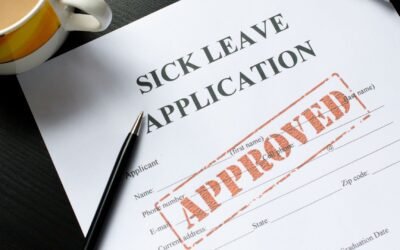Employee absence and lateness can be a costly business. Whether you have one or more members of staff on short-term or long-term leave or always late to work, our guide will help reduce employee absence and lateness.


Reduce Absence, Improve Attendance
Whilst we look at the reasons behind staff off work, we also provide practical advice for employers on absence management.- Learn how to manage unauthorised absence.
- What to include in your absence policy.
- The best return-to-work route.
- Improve employee attendance.
Reasons for Absence
Most reasons for absence are genuine, and employees often need treating with care during this time. Just find a healthy balance between providing vital support whilst still following your absence policy procedures. CIPD’s 2021 Health and wellbeing at work survey identify the main causes of short-term sickness absence. Lisa Ayling, solicitor and employment law specialist and Rachel Suff report:- Minor illness.
- Musculoskeletal injuries.
- COVID-19.
- Mental health conditions.
- Long-term health conditions.
- Care for dependents.
- Compassionate leave.
- Educational leave.
- Medical appointments.
- Pregnancy and parental related leave.
- Public or trade union duties.
- Bad weather conditions or travel disruptions.
Minimise Unauthorised Absence
Unauthorised absence is when someone fails to show up for work. If no contact is made by the employee, they should go on record as AWOL, or absent without leave. Should your employee be unable to provide a good reason for absence, it’s perhaps time to dig out your discipline and grievance management policy. Disciplinary procedures for unauthorised absence should make it clear to staff that unapproved absence will not be tolerated. Whilst your absence policy should be regulated in your company handbook, effective absence management begins with supporting your employees. Promoting a positive attendance culture can help minimise unauthorised absence. Be aware that some areas of absence come with legal conditions, such as statutory sick pay (SSP), sick (now fit) notes and time off to help someone else. For further support and to avoid potential legal proceedings, we advise seeking HR consultancy services for employment contract advice.
Absence Policy Guide
Another business might have different rules to yours on what are acceptable reasons for absence. For this reason, your company should have its own absence policy. What makes an effective absence policy is a clear set of guidelines which supports your business objectives. Yet the document also needs to explain the rights and responsibilities of your employees. Legally, you must provide staff with information on any terms and conditions relating to absence from work, including any sick pay provision. Employees should be 100% clear on exactly what’s expected of them (and you) if they need to take time off work. Here are some facts to work into your company absence policy:- Provide details of contractual sick pay terms and how it works with statutory sick pay (SSP).
- How and when to report absences and who to notify.
- When your employee needs to complete a self-certificate form or provide a fit note.
- Explain how and when absence reviews will be held.
- Mention your right to require employees attend an examination by a company health professional or request a report from your employee’s own doctor (with consent).
- Give guidance on absence during major or adverse events such as pandemics or popular sporting events.
- How, when and with whom return to work interviews will be held.
- Plan and apply reasonable adjustments to help your employee return to work, such as different duties, workplace adaptations, a phased return or altered hours.
Improve Employee Attendance
As an employer, you should commit to a strong focus on employee wellbeing and health. Not only will this benefit your employees, but it’ll also help avoid absence issues developing. If you are concerned an employee has lots of absences, a mentor or extra training could be your first port of call. Research reveals many companies turn to line managers to take responsibility for staff absence management. Yet, the lack of training and support in absence management is clear. Strong communication skills are not sufficient. Expert HR training is required for effective absence management for:- Sickness awareness.
- Absence policies and procedures.
- How fit notes operate and how to act upon medical advice.
- Legal and disciplinary aspects of absence, including disability discrimination issues.
- Maintaining up to date records on absence.
How to Manage Employee Lateness
Do you have employees who often show up late for work? Improving accurate timekeeping of your staff is a constant battle for employers. Mainly if there is no company lateness policy. Get a step ahead by making lateness a thing of the past and having the right employment advice at hand. Apart from causing your business performance problems, frequent lateness can cause issues amongst employees. Be it one member of staff or an entire department, an HR investigation can discover the root cause and know how to prevent it from happening. Reasons may include a member of staff’s lack of motivation, an employee’s personal issues or in fact stem from your company’s culture. Should your lateness policy not resolve tardy timekeeping then it could be time to dig into your discipline and grievance management procedures. Alternatively, consider an HR outsourcing company to do the work for you.
Lateness Policy Advice – What Should a Lateness Policy Include?
An effective lateness policy plays a key part in preventing employee lateness. So, it’s very important that your employees read and understand your business procedures. Lateness policies should be clearly set out in your employee handbook or contract for all to see. Lateness guidance should include:- Evidence reminding employees that they’re expected to turn up to work in sufficient time to begin work at their contracted start time.
- Who employees should report to if they’re going to be late.
- What action will be taken if employees are frequently late, including your disciplinary procedure.
Poor Timekeeping at Work
Some employees’ working hours regularly change due to shift patterns or night shifts. Rotas should clearly set out working hours. Both you and your employee need to have a clear understanding of what hours they’re expected to work. Therefore, it’s essential that employees’ working hours are clearly communicated to them from the start. Usually, this will form part of their employment contract.Impact of Lateness
Whether an alarm failed to ring, traffic was at a standstill or an employee missed their bus, lateness has a huge impact on both your company and the employee. Here’s how:- Business can halt to a stop.
- Customers become irate.
- Companies lose profit.
- Employees experience an unproductive start to their day.
- Colleagues become fed up.
How to Reduce Lateness
We recommend taking these steps to reduce lateness within your business:- Make sure your lateness policy is read and understood by all employees.
- Check managers have a structured approach in asking employees why they’re late.
- Introduce a sign-in process.
- Suggest employees make up lost time or lose pay for time lost due to lateness.
- Take formal disciplinary action when employees continue to be late.





